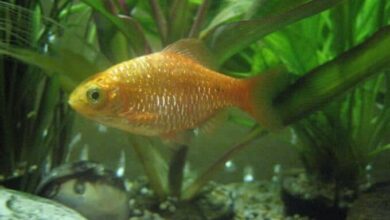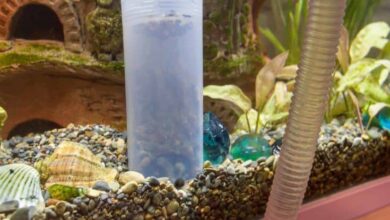The Best Water Conditioner for Betta Fish

An important but often overlooked part of setting up a small tank is how to use a water conditioner for betta fish. It can be difficult to sort through all the products, especially for novice aquarists. I was very confused about these treatments when I started raising fish!
So how do you choose the best betta water conditioner for your tank? It’s not as hard as it looks! There are just a few details you need to be aware of, and in this short guide, I’ll break them down and teach you how to choose the perfect product for your tank.
THE 6 BEST WATER CONDITIONERS for betta fish
Here is a list of water conditioners I recommend for treating betta bowls and tanks. I tried to find a variety of products to cover different tank sizes and situations at a variety of prices. All of these are high quality water conditioners and suitable for planted and community betta tanks.
1. API STRESS COAT water conditioner

- Size: 473 mL (16 fl oz)
- Dosage: 5 ml (1 teaspoon) per 10 gallons
- Full bottle treats: 94.6 gallons
- Removes: chlorine and chloramines
- Detoxifies: heavy metals
- Buffer: No
- Support slime layer: Yes
API Stress Coat was my favorite water conditioner for many years and is still something I always have on hand. Like the other products on the list, it removes chlorine, chloramine, and heavy metals from tap water. It was also the first product to contain aloe vera and minerals to maintain a healthy slime coat.
Even if you don’t use it for routine maintenance, the Stress Coat comes in handy when you have a sick or injured betta. It’s safe to use between water changes, and if your fish aren’t doing well, you can use a double dose of this conditioner to help them recover. I always use this to condition my hospital and breeding tanks.
pros
- Removes chlorine/ chloramine and detoxifies heavy metals from your water.
- Excellent for promoting a healthy slime coat and helping injured or sick bettas recover.
- Easy to dose for small and large aquariums.
cons
- It does not remove ammonia or nitrites from your aquarium water.
- Does not buffer your aquarium water
- Not specifically for betta fish
2. SEACHEM PRIME FRESH AND SALT WATER CONDITIONER

- Size: 250ml (8.5 fl oz)
- Dosage: 2 drops per gallon or 1 capful (5 ml) per 50 gallons
- Whole Bottle Treats: 2,500 gallons
- Removes: chlorine and chloramine
- Detoxifies: Ammonia, Nitrites and Heavy Metals
- Buffer: No
- Supports Slime Coat: Yes
There’s a reason Seachem Prime is the go-to product for so many expert fish keepers to maintain their aquariums. Quickly removes chlorine and chloramine from tap water. It also binds toxic ammonia and nitrites for up to 48 hours, so your filter can remove them from your aquarium. This is my favorite product for general use!
The highly concentrated formula is perfect for treating a wide range of tank sizes and is especially helpful if you have a 50 gallon or larger tank. But it’s not hard to measure a couple drops per gallon for betta bowls and small tanks. Since it also attacks ammonia, this is a great option to use between water changes.
pros
- Removes chlorine/ chloramine and detoxifies ammonia, nitrite, and heavy metals.
- It can be used between water changes to lower ammonia levels and reduce stress in a crowded tank.
- Offers the most bang for your buck as one bottle treats 2,500 gallons of water!
cons
- The highly concentrated formula is more difficult to measure for nano tanks and small betta bowls.
- The solution will not buffer the pH of your aquarium water.
- Not specifically for betta fish
3. SEACHEM betta BASICS
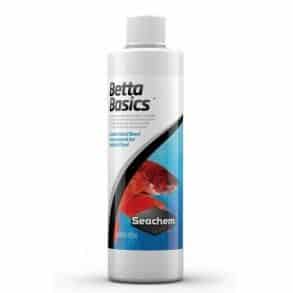
- Size: 250ml (8.5 fl oz)
- Dosage: 1 capful (5 ml) per 1 gallon of water
- Whole Bottle Treats: 50 Gallons
- Removes: chlorine and chloramines
- Detoxifies: Ammonia
- Buffered: Yes, buffers at pH 7
- Supports Slime Coat: No
Another option from Seachem is their betta Basics formula. Designed specifically for small betta bowls and nano tanks, Basics is a buffered conditioner that helps keep the water around neutral (pH 7.0). It will remove chlorine and chloramine and detoxify any ammonia that builds up between water changes.
The bottle makes it easy to treat small amounts of water, even less than a gallon if you’re doing a 10% water change in a nano tank. The formulation is much more diluted than Seachem Prime. That said, this product can be toxic to invertebrates, so don’t use it if you have small shrimp in the tank with your betta fish.
pros
- Removes chlorine/ chloramine and detoxifies ammonia
- Stabilizes and buffers the pH of the water to keep it around 7.0
- Easy to dose small amounts of water.
cons
- Does not remove heavy metals from water.
- Phosphate-based buffer can cause a white residue to form along the water line and is toxic to shrimp.
- The damping effect is greatly diminished and may not work properly if the water is very hard.
4. TETRA AQUASAFE FOR BETTAS

- Size: 50ml (1.69 fl oz)
- Dosage: 1 ml (14 drops) per gallon or 1 capful (5 ml) per 5 gallons
- Whole Bottle Treats: 50 Gallons
- Removes: chlorine and chloramines
- Detoxifies: heavy metals
- Buffer: No
- Supports Slime Coat: Yes
Tetra’s newly reformulated conditioner now bears the name AquaSafe for Bettas. The older formula, Betta Safe, has a different concentration, so make sure you know which product you’re buying. This is an excellent option for treating small tanks after routine water changes.
AquaSafe removes chlorine, chloramines and heavy metals from tap water. It also contains a blend of vitamins and minerals that help your betta fish stay healthy and special ingredients that promote the formation of their slime coat. The formula has no frills, but is perfect for general maintenance. Pros Cons
pros
- Removes chlorine/ chloramine and detoxifies heavy metals from tap water.
- Contains vitamins and minerals to keep your betta fish healthy.
- Supports a healthy slime coat
cons
- Does not detoxify ammonia or nitrites
- Diluted formula not suitable for larger tanks (over 10 gallons)
- The solution will not buffer the pH of your aquarium water
5. API betta water conditioner
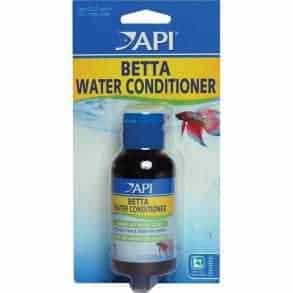
- Size: 50 ml (1.7 fl oz)
- Dosage: 2.5 mL (½ teaspoon) per gallon
- Whole Bottle Treats: 20 Gallons
- Removes: chlorine and chloramines
- Detoxifies: heavy metals
- Buffer: No
- Support slime layer: Yes
API is well known for its high-quality aquarium products, and its Betta Water Conditioner is no exception. Designed specifically for bettas, it quickly removes chlorine, chloramines, and heavy metals from your aquarium. Its proprietary formula stimulates the formation of your betta’s slime coat and helps keep it healthy.
API Betta Conditioner is a diluted formula perfect for dosing fish tanks. However, it is a bit too thin to use in bowls larger than 5 gallons. You would have to use too much product for it to be profitable. If you have a small betta bowl and you change the water frequently, this could be a great option for you.
pros
- Removes chlorine/ chloramine and detoxifies heavy metals from tap water.
- Special formula promotes a healthy slime coat on your betta
- Diluted formula is ideal for dosing tanks less than 5 gallons in size
cons
- Does not remove ammonia or nitrites from your aquarium
- The formula is too dilute to be practical for larger bowls and tanks.
- Does not buffer the pH of your aquarium water
6. ZOO WITH betta H2O CONDITIONER

- Size: 15 mL (0.5 fl oz)
- Dosage: 10 drops per gallon or 5 ml (1 teaspoon) per 10 gallons
- Full Bottle Treats: 30 Gallons
- Removes: chlorine and chloramines
- Detoxifies: nitrites and heavy metals
- Buffer: No
- Support slime layer: Yes
If you have a small betta tank and want a conditioner that is really easy to use, check out Zoo Med betta H2O. This formula is ideal for fish tanks and small fish tanks. Removes chlorine, chloramine, nitrite, and heavy metals from tap water. It also helps keep fish healthy by promoting the formation of their slime layer.
The Zoo Med bottle has a specially designed tip that makes it very easy to add the correct dose of conditioner to your aquarium. When you invert the bottle and squeeze, the drops of conditioner come out with ease and precision. Just count the correct number of drops for your tank size and voila! Pros Cons
pros
- Removes chlorine/ chloramine and detoxifies nitrite and heavy metals from water.
- Special tip makes it easy to dispense the exact number of drops you need to condition your tank
- Trace minerals support the formation of your betta ‘s slime coat
cons
- The bottle is too small and the formula too dilute to be convenient for dosing larger tanks.
- Does not remove ammonia from your aquarium
- Formula will not buffer your aquarium water
GUIDE to buy a water conditioner FOR betta fish
Water conditioners and other water treatment products are a must when keeping aquariums, and betta fish tanks are no different. Most municipalities add chemicals to their water supplies to kill disease-carrying microorganisms that could make us sick. But these chemicals are deadly to our betta fish!
The main reason we use water conditioners is to remove these toxic chemicals from tap water so they don’t poison our aquariums. But not all water conditioners are created equal. Some products bring more to the table and also perform other functions in your betta tank.
WATER CONDITIONERS REMOVE CHLORINE FROM TAP WATER
All of the water conditioning products I have researched remove chlorine and chloramines from tap water instantly once they are added to a tank. This is its basic and most important feature.It is absolutely necessary to use a water conditioner unless you are 100% sure your water supply is not adulterated.

It used to be the case that you could leave a container of water uncovered for 24 hours and the chlorine would evaporate. After a day, you can safely add the water to your tank without using any water treatment and your fish will be fine. Since most cities have switched to chloramine use, this technique is no longer safe.
ADDITIONAL FUNCTIONS OF WATER CONDITIONERS
What else can a water conditioner do for your betta tank and why would you need a product that does multiple things? It depends on the quality of the tap water and the conditions of your tank. Buying a conditioner that can handle multiple tasks can save you money since you won’t have to buy additional products.
Detoxifies heavy metals and phosphate
Tap water often carries microscopic heavy metal particles that can harm your betta fish or their tank mates. Zinc, copper, and iron can enter the water naturally or through corrosion of old pipes. These metals can stress and poison fish and are especially lethal to invertebrates.
Phosphates from agriculture and plant fertilizers are often present in both well and tap water supplies. While they won’t harm your betta fish, they do encourage algal blooms in your tank. Removing them from your aquarium water can help you avoid problems with green water and excessive algae growth.
Detoxifies ammonia and nitrites.

Ammonia and nitrite are toxic waste products that the «good» bacteria in your tank can help neutralize. But sometimes these toxins build up and overwhelm the bacteria in your betta tank. A water conditioner can convert them to their safest form.
This feature is not commonly seen in betta fish water treatments, because these small tanks usually only house a single fish. If you keep up with water changes, you may not need this feature on a water conditioner. But a crowded community tank usually benefits from a product that can handle ammonia and nitrites.
Buffers the pH of the water
Some conditioning products also buffer the pH of the water to limit fluctuations that could stress your betta fish. I won’t bore you with the chemistry behind buffering! Suffice it to say that they do this so that the pH of the water does not easily rise or fall. This could be a useful thing or a horrible option for your betta tank.
If the pH of your tap water is outside of the ideal range for bettas, then you will need to use a product to adjust it up or down. In this case, avoid buffered water conditioners!They will fight the product you are using to adjust the pH and nullify it. If the pH of your tap water is closer to 7.0, you can use a buffered conditioner.
Promotes a healthy slime coat
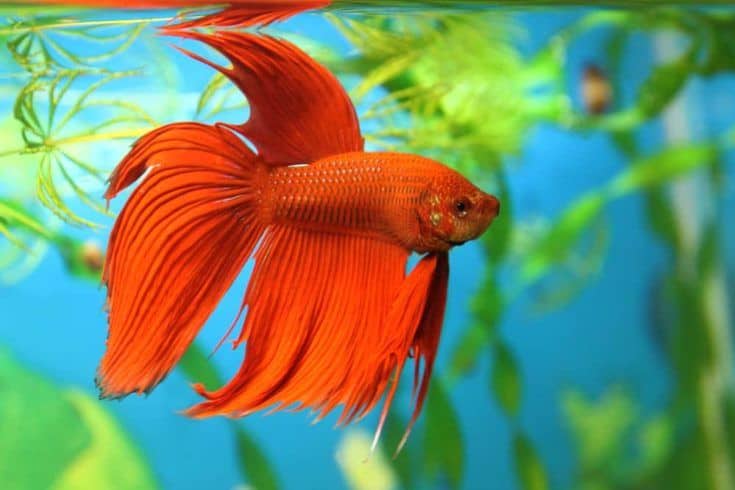
Many water conditioners contain aloe vera or other ingredients that promote a healthy slime coating on your fish. The slime coating on a betta fish is what protects it from being infected by parasites, bacteria, viruses, and fungi. You may want to consider products that enhance their slime coat, especially if your fish is recovering from illness or injury.
HOW TO CHOOSE THE BEST water conditioner FOR YOUR TANK
Now that you have the background on what a water conditioner can do to keep your betta fish safe and healthy, how can you choose and use the best product for your tank?
CONCENTRATION, DOSE AND NUMBER OF TREATMENTS
Water conditioners come in a wide range of concentrations and bottle sizes and it can be difficult to compare between brands. Your dose per gallon also varies a lot. To make things easier, I always check the instructions before buying a product. That way I know the dose my tank will require and how many doses I will get from each bottle.
I know it’s tempting to buy a huge bottle to save money, but this isn’t always the best way to go. If you are treating a 5 gallon betta bowl with a super concentrated formula, it can be difficult to measure the correct dose. So look for a brand that makes it easy to measure or dispense the dose you’ll need for your tank.
CHECK FOR ADDITIONAL FEATURES

While most products these days remove both chlorine and chloramines from tap water, there are still some old-school products that only work for chlorine. Make sure the product you choose can tackle both! I also recommend getting a product that detoxifies heavy metals, especially if your home or town has old lead or copper pipes.
As for ammonia and nitrite removal, this can be helpful at times, but is rarely needed for routine maintenance on betta tanks. Regular water changes do the same thing and leave enough waste behind to “feed” the good bacteria. These can be helpful but not necessary for a betta tank.
HOW TO USE WATER CONDITIONER FOR YOUR betta TANK
Once you’ve done a water change and added fresh tap water to your betta tank, simply follow the dosage instructions on your bottle of conditioner. The dosage is usually measured in drops, teaspoons, capfuls, or pumps of conditioner per gallon of water added. You also don’t have to be very precise in your measurements.

All-purpose water conditioners may have different dosage guidelines depending on what you are using them for. To detoxify ammonia or promote healing in an injured fish, you may need to add 2-3 times the regular dose to your tank. In that case, it will calculate the dosage based on the size of your aquarium rather than the amount of water you are changing.
CONCLUSION
If you’ve been shopping for conditioners, then you know how many products are marketed as betta water treatments. The truth is that betta fish do not need a special conditioner or one that is branded for bettas specifically. Any high-quality water conditioner will keep your betta safe from toxic chlorine and chloramines.
The key way to differentiate between conditioning products is to compare their dosage amounts per gallon. Some products will also buffer the pH of your aquarium water to keep it stable. Other products remove ammonia and/or nitrites, which could stress the fish. The best products also support a healthy slime coat.
I hope this article has helped you choose the perfect product for your fish tank or aquarium! We’d love to hear about your experiences with water conditioners in the comments.
If you’re still not sure which product to use:
- Our Experts Pick, the Seachem Prime, is a great choice for aquariums of any size and is my current favorite product for bettas.
- If you have a small tank or betta bowl, consider Seachem Basic or API Betta Water Conditioners.
- For the easiest option to dispense, the Zoo Med’s special tip will make dosing your tank as easy as counting a few drops.
- You can never go wrong choosing Stress Coat, and it’s a great product to have on hand if you need to treat an injured or sick betta.



